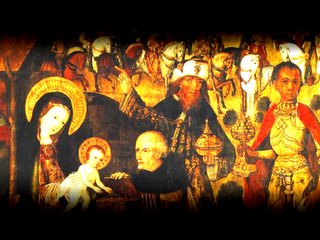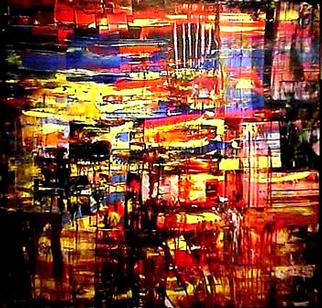
I was first introduced to the idea of Lamed Vov by Len Sweet. Since then, I have traced this fabulous myth through texts and pop culture, online wiki sources and photographic essays and come to find that herein lies a powerful truth for all followers of Jesus Christ.
The Lamed Vov are thirty-six Just Men who though their deep love and devotion help the world go forward. No one knows who they are. They don’t even know who they are. …this is similar to those Jesus described who lived lives of such service to others that at the Last Judgment they have no memory of having ‘clothed or fed the least of these.’”[1]
The Lamed Vov represent what is noblest in humanity. Theirs is a spirituality of engagement that brings the presence of righteousness into a world of diminishing rectitude. They set an example for us to “partner with God in the redemption of the world”[2] and demonstrate the freedom to “claim the good, the true, [and] the holy wherever and whenever [they] find it.”[3] This is crucial for us if we are ever to go beyond sin management into a faith that has meaning for our lives, a faith that can make us care.
This kind of spirituality requires that churches and Christ followers abandon a doctrine of behavior modification. Instead we ought to embrace holiness that “is not primarily defined by what we don’t do, but rather by what we do in our hallowing of the everyday.”[4] This translates to a fundamental shift Left, especially for Evangelicals. We need to embrace Justice and world help; creating Heaven on earth, not just making attempts to escape earth and claw our way past St. Peter. This is a step away from concerns about piety and towards concerns about activism. It is the kind of attitude Tony Campolo notes when he remarks that no one ever called Jesus “pious” because he was “was too busy expressing compassion to measure up to the expectations of piety.”[5]
The Lamed Vov are people remembering how to care. They are a vaccine of care. The absence of care is pestilence, and it infects everything from our hearts and our clergy to the world and the marketplace. “We don’t believe what we’re saying anymore” says Doc Searles about this heartlessness “[and] we know that no one else believes it either, but we keep saying it because because because [sic.] the needle’s stuck…who would we be if not the people who say these things?”[6] Searles’ powerful text on the voice of online interactivity, The Cluetrain Manifesto, sparked an uprising of the hyperlinked business community in response to this societal blasé. This text would also serve the church well; for we must disavow ourselves of the notion that our beliefs and intellectual assent are sufficient. Meaning is the commodity of choice in a spiritual world, not intellect. We must understand that our deeds are not only sacramental, but “they are themselves relevatory [and reveal] God in His goodness.”[7] Where once we flouted our spiritual freedom, we must now also brag of our engagement in the world; for “there is no freedom of God without the politics of justice and compassion, and there is no politic of justice and compassion without a religion of the freedom of God.”[8]
When I think of the Lamed Vov, I cannot help but wonder who they would be if they really existed. Yet in spite of our immediate reflex to consider great and noteworthy people as possible members of this ongoing legend - people like Mother Theresa or Bono, John Paul II, Desmond Tutu and Thomas Merton - we may do well to consider that God has often looked to the simple to find His reflection. It is the humble offering of the widow who gave her two mites that reflect Him most, and it may very well be men like Dave Midkiff - who daily pulls recyclable material out of my trash and teaches school children about ecology - in whom God has found resonance. It may be people like Maria – whom I met while in Juarez, who gave all she had to an orphanage and died in the city dump - who truly embody the truth of the Lamed Vov.
Regardless, we can be certain that this mythology expresses a far different manifestation of Christianity than the high-gloss book store themes so prevalent among WWJD wearing teens, or the pop theology offered in “how to” texts in church lobbies. Instead, The Lamed Vov are more likely to be with Jesus in a gay bar in San Francisco, “working with people who have aids…the new lepers.”[9]
Jesus will always be with the lepers, and so should we.
[1] Sweet, Len. Out of the Question…Into the Mystery, (Grand Rapids: Zondervan, 2004), 182-183.
[2] Frost, Alan and Michael Hirsch. The Shaping of Things to Come: Innovation and Mission for the 21st Century Church, (Auckland: Hendrickson Publishers, 2003), 115.
[3] Bell, Rob. Velvet Elvis: Repainting the Christian Faith, (Grand Rapids: Zondervan, 2005), 80.
[4] Frost, Alan and Michael Hirsch. The Shaping of Things to Come: Innovation and Mission for the 21st Century Church, (Auckland: Hendrickson Publishers, 2003), 132.
[5] As quoted in 21CC, November 1990, p,27.
[6] Locke, Christopher and Rick Levine, Doc Searles, David Weinberger. The Cluetrain Manifesto: The End of Business as Usual, (New York: Perseus, 2001), 179.
[7] Frost, Alan and Michael Hirsch. The Shaping of Things to Come: Innovation and Mission for the 21st Century Church, (Auckland: Hendrickson Publishers, 2003), 137.
[8] Brueggemann, Walter. The Prophetic Imagination, (Minneapolis: Augsburg Fortress Press, 2001), 9.
[9] Frost, Alan and Michael Hirsch. The Shaping of Things to Come: Innovation and Mission for the 21st Century Church, (Auckland: Hendrickson Publishers, 2003), 25.





